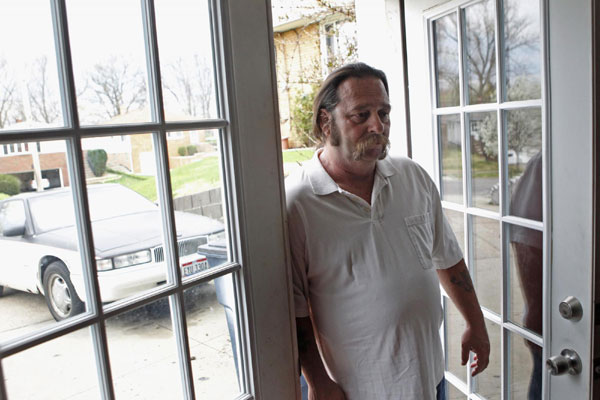
"Hard to catch up"
Until December 2010, Daniel Burns, 52, had spent his working life in the trucking industry as a long-haul driver and manager. When daily loads at the small family business where he worked tailed off, he lost his job.
 |
|
Daniel Burns, 52, stands in the doorway of his home in Garfield Heights, Ohio March 23, 2012. [Photo/Agencies] |
Unable to cover his mortgage, Burns received a grant from a government fund using money repaid from the 2008 bank bailout. That grant is due to expire in early 2013 and Burns is holding out on hopeful comments from his former employer that he might get his job back if the economy recovers.
"If things don't pick up, I will be out on the street," he said, staring from his living room window at two abandoned houses over the road in the middle-class Cleveland suburb of Garfield Heights, the noise of traffic from a nearby Interstate highway filling the street.
Underscoring the uncertainty of his situation, Burns' cell phone rings and a pre-recorded message announces that his unemployment benefits are due to be cut off in April.
A bit further up the shore of Lake Erie, Cristal Fell, who works night shifts entering data for a trucking company in Toledo, has fallen behind on her mortgage a second time because her ex-husband lost his job and her overtime was cut.
"Once you get behind it's so hard to catch up," she said.
Fell, a mother of four, hopes the economy will gather enough speed to help her avoid any risk of losing her home. Her ex-husband has found a new job and she is getting more overtime, so she hopes she can catch up on her mortgage by the fall.
Burns and Fell are the new face of the US housing crisis: Middle class, suburban or rural with a conventional 30-year fixed mortgage at a reasonable interest rate, but unemployed or underemployed. Although the national unemployment rate has fallen to 8.3 percent from its peak of 10 percent in October 2009, nearly 13 million Americans remain jobless, meaning many are struggling to keep up with their mortgage payments.
Real estate company Zillow Inc says more than one in four American homeowners were "under water" or owed more than their homes were worth in the fourth quarter of 2011. The crisis has wiped out some $7 trillion in US household wealth.
"We're seeing more people coming through who have good loans with reasonable interest rates," said Ed Jacob, executive director of non-profit lender Neighborhood Housing Services of Chicago Inc, which provides foreclosure counseling. "But in many households only one person works now instead of two, or they had their hours cut."
"The answer to the housing crisis now is job creation."
Early signs of uptick?
Zillow expects the resurgence in foreclosures this year, combined with excess inventory of unsold, bank-owned homes will contribute to a 3.7 percent national decline in prices before the market hits bottom in 2013 and stays there until 2016.
"The hangover from this crisis will far outlast the party of the boom years," said Zillow chief economist Stan Humphries.
Getting through the remaining foreclosures and dealing with the resulting flood of homes on the market in the wake of the bank settlement is a necessary part of the healing process for the US housing market, he added.
According to leading broker dealer Amherst Securities, some 9.5 million homes are still at risk of default and in February it said it expected to see the uptick in foreclosures start to hit in March and April.
There is other evidence that many of the foreclosures that did not happen in 2011 will happen this year.
A January report by the Neighborhood Economic Development Advocacy Project in New York found that in the first half of 2011 the number of 90-day pre-foreclosure notices in New York City outnumbered court foreclosure actions by a ratio of 14 to one, indicating that while proceedings were initiated against many homeowners, they were left incomplete.
"Now the banks have a settlement, foreclosure numbers for 2012 are going to be high," said NEDAP co-director Josh Zinner.
A recent survey by the California Reinvestment Coalition, an umbrella group of nearly 300 non-profit groups in the state, of member agencies found 75 percent of respondents expected increased demand for their foreclosure prevention services in 2012 but more than a third had to scale back services because of funding cuts.
"Funding is a major concern given what our members expect for this year," said associate director Kevin Stein.
All this has non-profits intensifying calls for the Federal Housing Finance Agency to drop its opposition to allowing the government-backed mortgage giants Fannie Mae and Freddie Mac it regulates to reduce principal for underwater homeowners.
Principal reduction involves reducing the amount borrowers owe in order to make a loan modification affordable for struggling homeowners. Republicans and the FHFA oppose principal reduction because of the risk of "moral hazard"- that homeowners who do not need help will seek to abuse largesse and have their mortgages reduced too.
ESOP in Ohio engages in "hits" on Chase branches -- they say Chase is the least accommodating major bank when it comes to working with struggling homeowners -- where they try to hand letters to bank mangers calling on chief executive Jamie Dimon to lobby FHFA head Edward DeMarco for principal reductions. A Chase spokeswoman said the bank has made "extensive efforts" to work with homeowners, helping 775,000 borrowers stay in their homes since early 2009, avoiding foreclosure "more than twice as often as we have had to foreclose." Housing groups like ESOP maintain, as they have throughout the housing crisis, that unless the FHFA embraces widespread principal reduction, many more under water borrowers face losing their homes.
"Until banks engage in meaningful principal reduction as a matter of course," ESOP's Seifert said after a recent protest at a Chase branch in Cleveland, "this crisis will not end."